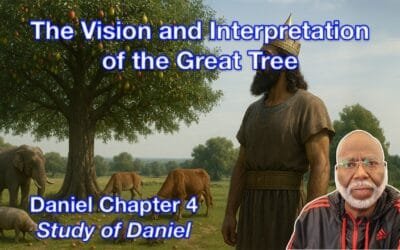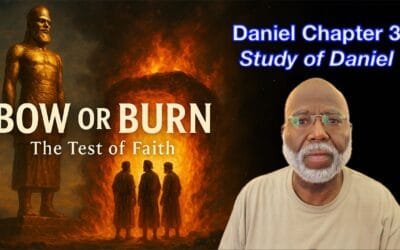Sign up for your free membership to
get access to member-only content.
Behind the Scenes: Angels at War (Daniel Chapter 10)
Daniel 10 records Daniel mourning and fasting for three weeks when a radiant heavenly figure appears by the Tigris River. Daniel collapses at the sight, and an angel strengthens him, explaining that his arrival was delayed by the “prince of Persia” until Michael came to help. The messenger tells Daniel he has come to reveal future conflicts involving Persia and Greece. The chapter exposes the unseen spiritual warfare behind earthly kingdoms and prepares Daniel for the vision that follows in chapters 11–12.
The 70 Weeks of Daniel: Israel’s Restoration (Daniel Chapter 9)
Daniel 9 presents Daniel’s prayer of confession for Israel’s sins and his plea for restoration. In response, Gabriel reveals the prophecy of the “seventy weeks,” outlining God’s timetable for Israel’s future: the coming of the Messiah, the rebuilding of Jerusalem, the Messiah being “cut off,” the destruction of the city, and events leading to the final culmination of God’s plan.
Daniel’s Vision: The Ram and the Goat and the Coming Anti-Christ (Daniel Chapter 8)
Daniel 8 records Daniel’s vision of a ram with two horns (symbolizing the Medo-Persian Empire) and a goat with a prominent horn (representing Greece and its first king, Alexander the Great). The goat’s great horn is broken, and four arise in its place—referring to the division of Alexander’s empire. From one of these comes a “little horn”—a fierce, blasphemous ruler (fulfilled in Antiochus Epiphanes and foreshadowing the Antichrist)—who desecrates the sanctuary and persecutes God’s people until divine judgment brings his downfall and the sanctuary is restored.
The Four Beasts of Daniel (Daniel Chapter 7)
In Daniel chapter 7, Daniel sees four beasts rise from the sea: lion with eagle wings, bear with three ribs, four-headed leopard, and a terrifying ten-horned beast with iron teeth. A little horn uproots three, speaks boastfully. The Ancient of Days judges on a fiery throne; books open, beast slain. The Son of Man receives everlasting dominion; saints inherit the kingdom. The vision foretells empires and end-time victory for God’s people.
Daniel in the Lion’s Den (Daniel Chapter 6)
In Daniel chapter 6, Daniel remains faithful to God despite a royal decree forbidding prayer. His rivals conspire against him, and he is cast into a den of lions. God miraculously delivers him, demonstrating divine protection and justice. King Darius acknowledges God’s power, and Daniel’s faith is vindicated.
Babylon is Taken: The Handwriting on the Wall (Daniel Chapter 5)
In Daniel chapter 5, King Belshazzar holds a lavish feast using the sacred vessels from the Jerusalem temple, mocking God. A hand appears and writes mysterious words on the wall: Mene, Mene, Tekel, Upharsin. Daniel interprets the writing as God’s judgment—Belshazzar’s reign has been weighed, found wanting, and will end. That very night, Babylon falls to the Medes and Persians, fulfilling divine prophecy.
The Vision and Interpretation of the Great Tree (Daniel Chapter 4)
In Daniel 4, King Nebuchadnezzar recounts his dream of a vast tree cut down at heaven’s decree, symbolizing his coming humiliation for pride. Daniel interprets the dream, warning the king to repent. Nebuchadnezzar’s arrogance leads to his temporary insanity and exile among beasts until he acknowledges God’s sovereignty. When he humbles himself, his sanity and kingdom are restored, and he praises the Most High as ruler over all.
Faith in the Fire: The Fiery Furnace of Daniel 3 (Daniel Chapter 3)
In Daniel 3, King Nebuchadnezzar commands all to worship a massive golden image, threatening death in a fiery furnace for refusal. Shadrach, Meshach, and Abednego refuse to bow, remaining loyal to God. They are thrown into the furnace but are miraculously unharmed, and a fourth figure appears with them. Seeing their deliverance, Nebuchadnezzar praises the God who saved them and decrees His honor throughout the kingdom.
Nebuchadnezzar’s Dream and Daniel’s Revelation of the Kingdoms (Daniel Chapter 2)
Daniel 2 recounts King Nebuchadnezzar’s troubling dream of a great statue representing successive earthly kingdoms, which only Daniel, through God’s revelation, is able to interpret. The dream foretells the rise and fall of human empires and the ultimate establishment of God’s eternal kingdom that will never be destroyed.
God Honors Faithfulness (Daniel Chapter 1)
Daniel and other young men of Judah are taken to Babylon for royal service. Refusing to defile themselves with the king’s food, they remain faithful to God and are blessed with wisdom, health, and favor, surpassing all others in the king’s court.
Preach the Word! (2 Timothy Chapter 4)
In 2 Timothy 4, Paul charges Timothy to preach the Word faithfully, endure hardship, and fulfill his ministry. As Paul nears death, he reflects on finishing his race and keeping the faith, confident of the crown of righteousness and the Lord’s deliverance into His heavenly kingdom.
The Rise of False Teachers in the Last Days (2 Timothy Chapter 3)
2 Timothy 3 warns that the last days will be marked by widespread ungodliness—people loving themselves and pleasure rather than God, while only maintaining an outward form of religion. Paul contrasts this corruption with Timothy’s calling: to follow his example of faith, endurance, and suffering for Christ. The chapter closes with the reminder that all Scripture is God-breathed, profitable for teaching, correction, and training, fully equipping the servant of God for every good work.












